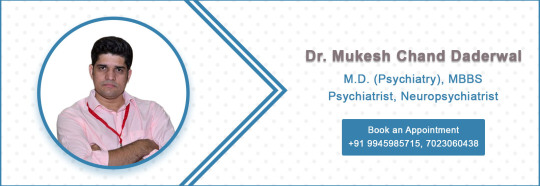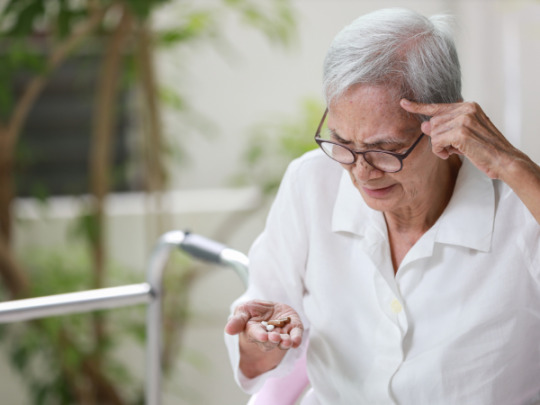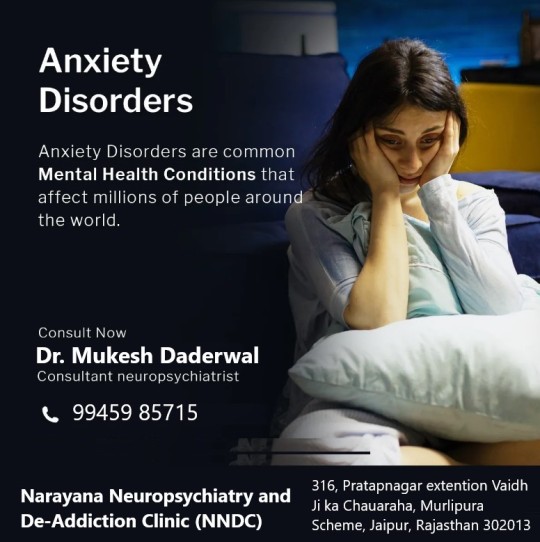#neuropsychiatric
Text
Dr. Mukesh daderwal: - Psychiatrist |Neuropsychiatric| in Jaipur
Jaipur, the Pink City of India, is known for its rich history and vibrant culture. Apart from its architectural wonders, the city also offers a range of mental health services for those in need. If you're looking for a psychiatrist in Jaipur, , you've come to the right place.

Professional Expertise: Jaipur boasts a dedicated team of qualified psychiatrists who specialize in various mental health disorders, including anxiety, depression, addiction, and more.
Therapeutic Approach: These psychiatrists follow evidence-based practices and employ a wide range of therapeutic approaches, including cognitive- behavioural therapy (CBT), psychotherapy, and medication management.
Holistic Treatment: They believe in a holistic approach that considers the physical, emotional, and social well-being of the patient. They focus on understanding the underlying causes and tailor treatment plans accordingly.
Supportive Environment: Jaipur's psychiatrists provide a supportive and non-judgmental environment for their patients. They understand the importance of building trust and establishing a strong therapeutic alliance.
Patient-Centered Care: Each patient is treated as an individual with unique needs and requirements. The psychiatrists in Jaipur work closely with their patients, involving them in decision-making and setting goals for treatment.
Well-Equipped Clinics: Jaipur is home to well-equipped clinics that facilitate comprehensive mental health care. These clinics provide a calm and comfortable environment for patients to receive treatment.
Continued Care: The psychiatrists in Jaipur offer continued support to their patients even after the initial treatment is completed. They believe in long-term care and offer follow-up sessions to ensure the well-being of their patients.
If you're seeking psychiatric services in Jaipur, rest assured that you will find compassionate and professional care from experienced psychiatrists. Don't hesitate to reach out and seek the help you need for your mental well-being.
0 notes
Text
youtube
Pharma Franchise for Neuro & Psychiatric segment - PharmaFlair
#topneuropcdcompanies
#top neuro pcd companies list#best neuropsychiatry franchise company in India#pcd pharma franchise neuro psychiatric medicine company#neuropsychiatric#neuro pharma franchise#pharma franchise psychiatric range#Youtube
0 notes
Text
Tuesday at Uniting War Memorial- memory course-with lunch by the sea.
The Memory Course, Jessica and I were invited to this course on the recommendation of Andrew’s Neuropsychiatrist.
Running from 19th April to 31st May, the course deals with both theory and practice. We enjoy it, along with 14 other seniors experiencing Memory issues.
Today we had fun constructing a grocery list using various scenes of a comical nature at various parts of a home. We also tried…

View On WordPress
0 notes
Note
i mentioned lying to my doctor to my grandma (horrendous decision btw) and i just got stuck thinking like. in her day if i had disclosed how i feel to a doctor truly and honestly it would result in me being brought to a ward against my will and given electric shocks to “correct” me. something most everyone agrees with as despicable. and yet it doesn’t occur to her at all that if the medical world back then was so violent and wrong about so much that today’s logically could not have gotten rid of all of its problems in the course of less than a century lol
it's honestly interesting imo that you say "most everyone agrees" that forced institutionalisation/treatment are wrong, because like.... these things still happen! fundamentally the medical encounter is not structured to protect patient autonomy or even patient health; it is structured to promote physician authority to enforce social and medical standards of normality and wellness upon the patient's body and mind. there are specific modes of doing so that have declined in popularity (electropuncture, lobotomy [tho it's not true that the latter never occurs anymore either]) but there are others that are on the rise (psychotropic drugs, bariatric surgery). standards for patient consent have certainly changed, but these have never been equally applied (consider the de facto and de jure carveouts for patients who cannot read or speak in the physician's language; who are uninsured in countries w/out universal healthcare or non-citizens in countries with it; or, and this is crucial, who are simply declared to be too sick-insane to act in their own interests and whose consent is therefore explicitly not sought) and the standards are fairly toothless anyway, not to mention incapable of addressing the massive social-economic power differential between physician and patient, and also designed more to protect the physician from legal liability than anything else.
anyway my point is just that violation of patient autonomy is not something that can be fixed by, like, telling doctors to be nicer or care more, and it's not something that's lessening over time because the medical profession as it presently exists is coercive and authoritarian structurally and philosophically. an actually liberatory provision of medicine and health care requires a total paradigm shift (sorry) in terms of how we understand health, patient authority/autonomy, and the valuation of human bodies and lives.
#wrt psychotropic drugs i do not oppose drug seeking or taking lol#i am in fact so pro drugs that i think even the ones prescribed by physicians sometimes have value#my point is just that their widespread use is part of a neuropsychiatric discourse of normativity and productivity#and that patients should be given actual information about what these drugs can and cannot do (ie not a 'chemical imbalance' lie lmao)#and should be flying the plane so to speak when it comes to any tx plan but esp under the psychiatric umbrella
54 notes
·
View notes
Text
frustrated with the divide between “physical” and “mental” disability as two mutually exclusive groups. there’s is no clear cut way to define either without excluding some people. we can talk about specific issues without trying to exclude people who are part of just one group. “physical” disabilities can cause neuropsychiatric and cognitive symptoms. “mental” disabilities can cause very real physical symptoms.
I am not going “oh the brain is an organ so it’s a physical disability” here. I am saying the lines are much more blurred than psychological vs physical vs intellectual.
examples? MCAS is a “physical” disability of the immune system that can cause hives, joint pain & inflammation, cardiovascular symptoms, GI problems, interstitial cystitis, etc. it can also cause symptoms like intense anxiety and psychosis. autism is a “mental” disability associated with social issues, obsessive behavior and thoughts, impulsive decisions, etc. it can also cause motor coordination issues; GI symptoms; impact pain processing, proprioception, and interoception, etc. DID is “psychological” and comes with amnesia, disconnects from reality, identity issues, etc. it can also cause chronic fatigue, non-epileptic seizures, headache, chronic pain/differences in pain processing. POTS is a “physical” disability that causes syncope/presyncope, cardiovascular symptoms, poor temperature regulation, tremors, high norepinephrine (in hyperPOTS), etc. it also often causes cognitive issues/brain fog, poor concentration and memory, emotional dysregulation, etc.
disabled people frequently have classically physical symptoms like mobility issues, chronic pain, or any combination of GI/cardiovascular/neurological/immunological/other body system symptoms. disabled people frequently have classically neuropsychiatric symptoms like brain fog, PTSD from medical events, anxiety, depression, social difficulties, obsessive thoughts, poor memory or concentration, and other symptoms. the boxes these groups of symptoms fit in are rarely neat and tidy because the human experience does it like to be categorized easily.
trying to divide things like “this is ONLY about physical disabilities it doesn’t affect X/Y/Z” or “people with mental disabilities are the only ones affected by A/B/C”or any variation just divides the community. it can be more productive to talk about specific symptom groups than physical/mental which are broad, not clearly defined, and frequently overlap. e.g. “this conversation is about mobility disabilities” or “people with cognitive symptoms often experience Y and Z” instead of more arbitrary and often difficult to define labels. we are discovering more and more that “physical” disabilities can come with neuropsychiatric symptoms and comorbidities and “mental” disabilities can cause or frequently occur with more physical/physically documentable symptoms. this isn’t to say conversations about certain disability groups aren’t productive! they are! just that policing the borders between boxes is incredibly difficult without harming and excluding some of our community members.
#happy disability pride month I love you all regardless of the different niche experiences you have#love from your favorite mad babe with a mobility aid#chronic illness#disability#disabled#physically disabled#physical disability#mobility aid user#mental disability#psychiatric disability#neuropsychiatric disability#neurodivergence#happy disability pride month
14 notes
·
View notes
Text
i really dislike the term "mentally ill"
#i have a neuropsychiatric disorder#i'm not afflicted with an illness i'm just disabled#ocd isn't even fully mental and it's weird calling it an illness since it's just the way my brain works
3 notes
·
View notes
Text
´deer diary
#i dont know how to say it in english but i can try. im getting help for my neuropsychiatric stuff i meet this person every week and she#helps me with stuff and now im starting to visit some group activity things like tomorrow im attending one group and we're going bowling#which isn't really my thing but i want to go anyway i think it can be fun c: maybe i can even find new friends sometime? ?#also in autumn i will go to other groups near me..#yeah something like that.#i don t know why i suddenly feel like spamming things here
2 notes
·
View notes
Text
I think it's incredibly funny that during the first meeting I had with my psychologist he looked at my behaviour and just went *Points* Autism
#I have considered it a lot throughout my life#At this point in life I'm comfortable enough that it doesn't really matter for me whether I am diagnosed or not#But it IS entertaining that it's apparently that noticeable#He didn't even tell me. Just wrote in my journal that there's 'potential neuropsychiatric problem' and that’s how I found out
2 notes
·
View notes
Text
How Diet, Exercise, and Stress Influence Alzheimer's Susceptibility?

Alzheimer's disease worsens over time and can't be reversed. It mainly affects thinking, memory, and everyday tasks.
It's the most common type of dementia, which makes it hard to think and function normally. Alzheimer's gradually makes it harder for people to remember things and do simple tasks.
As it progresses, it interferes with daily life and makes it tough to do even basic activities.
Alzheimer's disease is a common condition that affects many people worldwide. It slowly affects how we think and remember things. As the disease gets worse, it becomes harder to do everyday tasks, which can make life tough.
Understanding where Alzheimer's comes from is really important because it helps us find ways to treat and prevent it. This blog is just the beginning of learning more about Alzheimer's disease.
We'll talk about what causes it, signs to look out for, different ways to neuropsychiatric illness treatment in Patna, and things we can do to lower the chances of getting it. Let's start exploring Alzheimer's together and help improve the lives of those affected by it.
What are causes of Alzheimer's ?
Alzheimer's disease is influenced by a combination of factors like our genes, environment, and lifestyle.
Changes in genes, especially in genes like APOE, can increase the chances of getting Alzheimer's by affecting how our brains handle proteins, which are vital for thinking.
Exposure to things like heavy metals and air pollution can also raise the risk of Alzheimer's by causing issues like inflammation and stress in the brain.
Alzheimer's disease caused by deficiency of certain nutrients, or not getting enough of them, can also contribute to the risk of Alzheimer's disease.
Making unhealthy choices, like not being active and eating lots of processed foods and sugary snacks, are also also considered as risk factors of Alzheimer's disease.
But, doing things like exercising regularly and eating lots of fruits, veggies, whole grains, and healthy fats can help keep our brains healthy and lower the risk of Alzheimer's.
Keeping our brains active with activities like reading and spending time with friends can also help keep our minds sharp and delay problems with thinking.
Resources like a "causes of Alzheimer's disease pdf" can give us more information about how Alzheimer's progresses, which helps us understand the different things that can lead to the disease.
Symptoms and Treatment of Alzheimer's disease
Finding Alzheimer's disease early is very important for starting treatment and making things better. Knowing the signs and symptoms is really helpful.
These can include memory problems, feeling confused, having trouble solving problems, and changes in mood or behaviour, which are symptoms of Alzheimer's disease.
As the disease gets worse, people might also have difficulty speaking, understanding space, and doing everyday tasks.
Even though there's no cure for Alzheimer's yet, there are different ways to help manage the symptoms and improve life quality.
Doctors might give medications to help with memory and thinking problems, which is one treatment of Alzheimer's disease, and therapy can help with changes in behaviour.
Making lifestyle changes, like exercising regularly and eating healthy, can also make a big difference.
Getting help early and finding the right treatment can really help slow down Alzheimer's and make life better for those affected.
Types of Alzheimer's disease
Alzheimer's disease is categorized into various types based on age of onset and underlying causes
Early-Onset Alzheimer's:
Affects people younger than 65.
Often runs in families.
Gets worse quickly with severe symptoms.
Late-Onset Alzheimer's:
More common in people 65 and older.
Affected by lifestyle factors like diet and exercise.
Develops slowly with symptoms getting worse over time.
Sporadic Alzheimer's:
Happens randomly with no clear genetic cause.
Linked to getting older and environmental factors.
Familial Alzheimer's:
Caused by genetic mutations passed down in families.
Affects multiple generations.
Usually starts earlier and progresses faster.
Prevention of Alzheimer's Disease
There are ways to prevent Alzheimer's. Doing exercises for our body and brain, like walking and solving puzzles, keeps our minds sharp and stops them from getting worse.
Eating lots of fruits, veggies, and foods with omega-3 fatty acids, like fish and nuts, helps keep our brains healthy and lowers swelling.
If we have health issues like diabetes or high blood pressure, taking medicine and changing how we live can stop them from hurting our brain and making our thinking worse.
Spending time with friends and doing things that make us think, like reading and learning new stuff, also helps keep our thinking strong and lowers our chances of getting Alzheimer's.
Doing these things helps us take control of our brain health and lowers our risk of Alzheimer's.
Conclusion
In conclusion, Alzheimer's disease is different for everyone. Understanding it well and spotting early signs of memory problems are important for handling it better.
Also, eating healthy and taking care of other health issues can lower the chances of getting Alzheimer's. It's also vital to support research, education, and advocacy to make more people aware and improve how we treat the disease.
By focusing on these things, we can work towards a future where Alzheimer's isn't as big of a problem for people and their families, making life better for those affected.
For expert guidance and treatment options, consider consulting the best psychiatrist in Patna, Bihar, specializing in neuropsychiatric illness treatment in Patna.
#best psychiatrist in Patna#Bihar#neuropsychiatric illness treatment in Patna#what are causes of alzheimer's#causes of alzheimer's disease#alzheimer's disease caused by deficiency of#risk factors of alzheimer's disease#treatment of alzheimer's disease#symptoms of alzheimer's disease#how to prevent alzheimer's disease#types of alzheimer's disease
0 notes
Text
Professional Detox Treatment Centre In Punjab | Zira Ekta Hospital
A Detox Treatment Centre in Punjab The Detox Treatment Center: A Guide to Drug and Alcohol Rehabilitation Why do human beings need to detox? There are many reasons why humans may want to detox. A few human beings may additionally need to detox because they have a substance abuse problem. Others may additionally want to. Visit us at - https://deaddictionhospital.co.in/detox-treatment-centre-in-punjab/

#Mind brain care hospital in punjab#Best neuropsychiatric hospital in punjab#Best deaddiction hospital in punjab#Best Nasha Mukti Kendra in punjab#Best alcohol De addiction in Amritsar#Drug De addiction hospital in punjab#De addiction rehabilitation centre in Jalandhar#De addiction hospital in Kapurthala
1 note
·
View note
Text
Yoga's Potential for Neuropsychiatric Disorders: A Scientific Exploration
Yoga's Ancient Wisdom in Modern Psychiatry: A Fusion of Ancient Wisdom and Modern Challenges
Yoga’s Potential for Neuropsychiatric Disorders: A Scientific Exploration
Understanding the Global Mental Health Challenge
To understand mental health challenges, we must first acknowledge the shortcomings of conventional approaches. Mental illnesses, despite advancements in treatment accessibility, continue to cast a shadow on global health.
The World Health Organization (WHO) has highlighted…

View On WordPress
#alternative therapies#ancient wisdom#annabackacupuncture#depression relief#herbs#hluse calls#Holistic Healing#Holistic Wellness#integrative healing#Mental health#mental health exploration#Mental Well-being#mind-body connection#mindfulness interventions#mindfulness practices#modern challenges#neurobiological effects#neuropsychiatric disorders#non-pharmacological interventions#Nondual Counseling#pacific palisades#psychopharmacology#redondo beach#santa monica#schizophrenia management#sleep improvement#yoga research#yoga science#zoom
0 notes
Text
Anxiety Disorders, Causes, Treatment – Narayana Neuropsychiatry and De-Addiction Clinic (NNDC)

Disorders of Anxiety
Disorders of Anxiety are common mental health issues that affect millions of people worldwide. They are characterised by feelings of anxiety, fear, and worry that frequently interfere with normal life and daily activities. In this article Dr. Mukesh Daderwal Neuropsychiatry at Narayana Neuropsychiatry and De-Addiction Clinic (NNDC) one of the best Neuropsychiatry in murlipura jaipur explains the cause of mental disorder and how to prevent it.
What are The Causes of Anxiety Disorders
There are several factors that can contribute to the development of anxiety disorders. Some of the common causes include:
Genetics: Anxiety disorders are more prevalent in those with a family history of the condition.
Brain chemistry: Anxiety disorders can also be caused by alterations in brain chemistry. Anxiety can be brought on by imbalances in neurotransmitters like serotonin and dopamine.
Factors from the outside: Anxiety disorders can be brought on by traumatic experiences like abuse, neglect, or violence. Additionally, chronic stress can contribute.
Conditions of the body: Certain ailments like thyroid issues, coronary illness, and diabetes can likewise add to the advancement of uneasiness.
How to Treat Anxiety Disorders
There are several effective treatments available for anxiety disorders. Some of the common treatments include:
Therapy: A form of talk therapy known as cognitive-behavioural therapy (CBT) aids individuals in recognizing and altering negative thought patterns and behaviours that contribute to anxiety. Additionally, exposure therapy, which gradually confronts fears, can be beneficial.
Medication: Anxiety disorders can be alleviated with the help of antidepressants and anti-anxiety medications. A healthcare professional should oversee the use of these medications.
Changes in lifestyle: Anxiety symptoms can also be reduced through regular exercise, healthy eating, and good sleeping habits. Meditation, yoga, and other forms of deep relaxation can also be beneficial.
Conclusion
Although anxiety disorders can be crippling, people can learn to manage their symptoms and improve their quality of life with the right treatment. It is essential to seek professional assistance if you or someone you know is experiencing anxiety symptoms.
For more information click here - https://goo.gl/maps/5un9G5LJhyCP1w2V9
Or visit -
Narayana Neuropsychiatry and De-Addiction Clinic (NNDC)
#Neuropsychiatric Clinic in Murlipura Jaipur#De-Addiction Clinic in Murlipura Jaipur#Neuropsychiatric in Murlipura Jaipur#Neuropsychiatric Doctor in Murlipura Jaipur#De-Addiction Specialist Therapist in Murlipura Jaipur#Psychiatric Clinic in Murlipura Jaipur#Best Psychiatrist in Murlipura Jaipur#Child Psychiatrist in Murlipura Jaipur#Neuropsychology Clinic in Murlipura Jaipur#Sexology Clinic in Murlipura Jaipur#Child Specialist in Murlipura Jaipur
1 note
·
View note
Text
-
1 note
·
View note